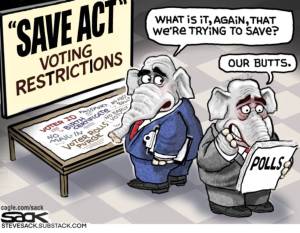Creating equity for minimum wage workers
Published 1:12 pm Tuesday, April 19, 2016
What is the value of work? Is it what you get paid? Economists trained to embrace the private market simply equate the value of your work with your wage. It’s simple, easy to understand…and wrong.
That equation is built on the theoretical idea of an economy with “perfect” competition – meaning no employer or employee has control over the market, so wages and prices settle into equilibrium, and no one has the power to game the system for surplus profits. Now, take a look at your internet provider’s bill.
For an Internet connection of 25 megabits per second (MPS), Washingtonians pay about $60/month — nearly double that of what residents in London, Seoul, and Bucharest, Romania, pay. And residents in cities such as Hong Kong, Seoul, Tokyo and Paris get connections nearly eight times faster. That’s not the only example – drug prices come to mind – that makes it clear our economy is not a model of perfect competition.
The simple fact is that we live and work in an economy where large corporations control most prices, output, profits and wages. Most workers do not have any individual power to determine their own wages. They seek jobs and start work at whatever wage, no questions asked. It’s a lopsided deal where workers having little or no bargaining power over the conditions of and compensation for their work. That’s usually why workers organize into unions – to gain some negotiating power to determine their wages and benefits. But five out of six workers in our state do not have a union.
The federal minimum wage is a national threshold for workers’ wages. Its high point was in 1968, when at $1.60 it was equivalent to $10.90 today. Now Washington’s minimum wage is $9.47, so we have a minimum wage which is 12.5% lower than it was 38 years ago!
For several decades after World War II, the minimum wage also kept up with increases in labor productivity – meaning that as workers produced more goods and services per hour, wages increased proportionally. But in the early 1970’s, wages stagnated, even as productivity continued to increase. The income from increased productivity started flowing to employers, not employees. If the minimum wage had kept up with productivity increases, it would exceed $22 today!
The decline in wages as a share of total national income (from 58% to 53% between 1970 and 2014) effectively amounted to a $535 billion transfer to corporate accounts, or $3,770 each year for every worker in the US. It’s what has funded the massive surge in corporate profits and cash, and fueled outsourcing of production and jobs to other countries that makes our economic problems worse.
Setting, maintaining and enforcing a minimum wage is as much as political decision as an economic one. Politics have typically tilted the scale away from workers, but this year in Washington we can put our collective thumbs on the other side of the scale to create some equity for minimum wage workers.
Volunteers are now out collecting signatures for Raise Up Washington, also known as Initiative 1433. I-1433 will step up the minimum wage in increments to $13.50 by 2020, putting more money in wage earners’ pockets. That means more purchases by these workers, which means more consumption, more profits, and more jobs down the line.
Initiative 1433 also creates a basic workplace standard which our state legislature has never addressed. One million workers in our state face a serious dilemma when they, or a loved one, are sick: go to work so you won’t lose a day’s pay or get fired – or take care of yourself (or the person who needs you) and hope you keep your job. Seattle, Tacoma and SeaTac have laws on the books ensuring people can earn sick time and use it when needed. But if you work in Everett – or anywhere else in Washington – there’s no public law that ensures you can earn and use sick time without economic risk.
Initiative `1433 makes paid sick days the law across our state, in every workplace, in every county, in every city. It protects workers and their families, as well as their co-workers and their customers. It combines paid sick days with a better minimum wage. It is a package of decency, respect, and common sense, benefiting all workers. That means it benefits all of us.
In a democracy, both our government and our economy should work for the People. Initiative 1433 is a step in that direction.
John Burbank is the executive director of the Economic Opportunity Institute, www.eoionline.org. Email him at john@eoionline.org.


